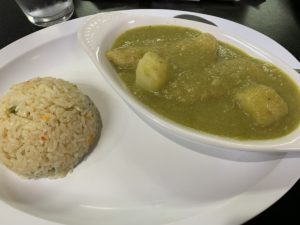Personal Statement describing the applicant’s background and experience and commitment to the goals of the Ford Foundation Fellowship Programs by addressing all of the following that apply (abridged version):
- Sustained personal engagement with communities that are underrepresented in the academy and ability to bring this asset to learning, teaching, and scholarship at the college or university level
- Capacity to respond in pedagogically productive ways to the learning needs of students from diverse backgrounds and likelihood of using the diversity of human experience as an educational resource in teaching and scholarship
- Applicants should describe their past and ongoing community service efforts such as: tutoring and mentoring students in challenging environments, participation in housing or public service projects, leadership and organizational skills that benefit a larger community, campus-based student activities, language teaching, involvement in professional organizations that serve the community
- Applicants should note anything in their background that speaks to their unique perspective, such as: first person or generation in family to achieve college degree or seek advanced degree
- Applicants may also cite the following: teaching methods and academic interests that are inclusive and sensitive to diversity, any successes that can be attributed to using new techniques to create an inclusive and respectful teaching and learning environment, personal goals, both long-standing and future-focused, that involve increasing understanding in the college or university setting and are in the broader context, employment that demonstrates a long-standing commitment to diversity and depth of understanding of a multicultural society, efforts to improve access and opportunity for all, particularly in one’s local community (neighborhood, place of worship, geographic region)
My experience as a Spanish learner has led me to engage with the Hispanic community in the US. I’ve always had a passion for Latin American culture, and I’ve always been conscious of the lack of resources in education for immigrants and other underprivileged groups. Only 63% of ESL students graduate from high school, and less than 2% of those students pursue a degree. These students are not given the opportunity to achieve their full potential due to their socioeconomic status and inability to speak English (Sanchez 2017).

Jocón, a traditional Guatemalan dish with indigenous roots
Furthermore, I’m currently working on an honors thesis on the grammar of an understudied Guatemalan language called Chuj. I was introduced to this language through my connection with the community that speaks it. In order to conduct my research, I interview native speakers of the language. Through my research I’ve formed relationships with people that belong to an underrepresented community, one that many people don’t even know exists in the US. One of my future goals is to bring more awareness to indigenous culture, which is one reason I have chosen to teach high school Spanish after I graduate. I want to use my privilege to be the voice for a group that very few are familiar with. My deep interest in indigenous culture has also drawn me to apply to the Ford Foundation Fellowship.
I’ve been accepted to be a high school Spanish teacher with Teach For America after I graduate, and I plan on simultaneously pursuing a master’s degree in education. Afterwards, I would like to continue the research I started as an undergraduate and pursue a PhD in linguistics. The experience I will gain as a teacher will improve my eligibility as an applicant for the Ford Foundation Fellowship, since it explicitly mentions education and teaching methods that cater to the needs of a diverse classroom. Teach For America emphasizes closing the opportunity gap that affects underprivileged groups, and therefore I will learn more about these groups and how to do my part to lessen the gap.
Additionally, I am the first person in my family to pursue a bachelor’s degree. My parents were never able to help me with homework or essays, and they knew less about the college application process than I did. I know what it’s like to navigate college applications on one’s own, and to be the only person in a group whose parents don’t have professional careers. I will be able to use this experience to guide other students in the process of applying for college when I’m a high school teacher, and for graduate school when I’m a professor.
Source: Sanchez, Claudio (Feb. 23, 2017). “English Language Learners: How Your State Is Doing.” Retrieved from: https://www.npr.org/sections/ed/2017/02/23/512451228/5-million-english-language-learners-a-vast-pool-of-talent-at-risk.